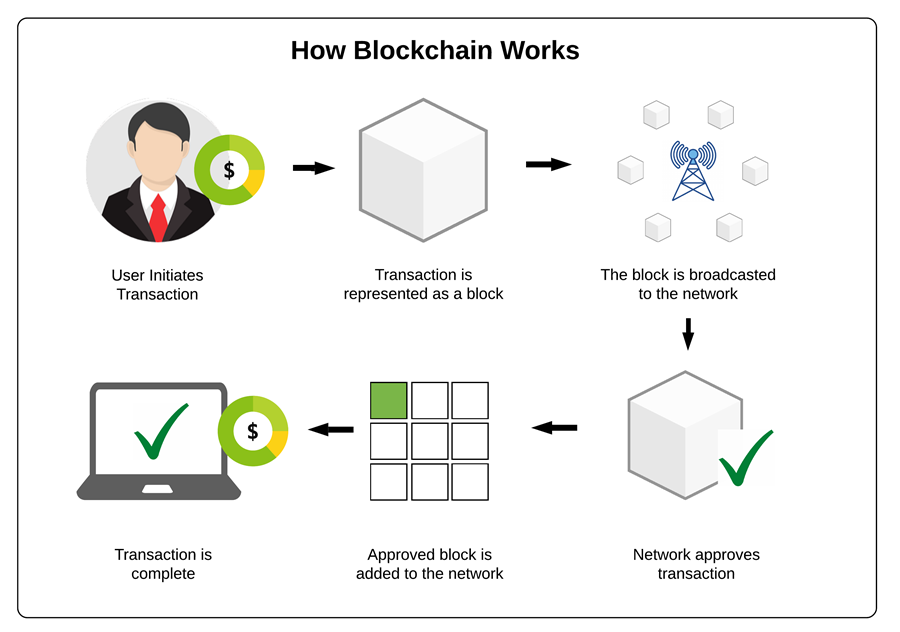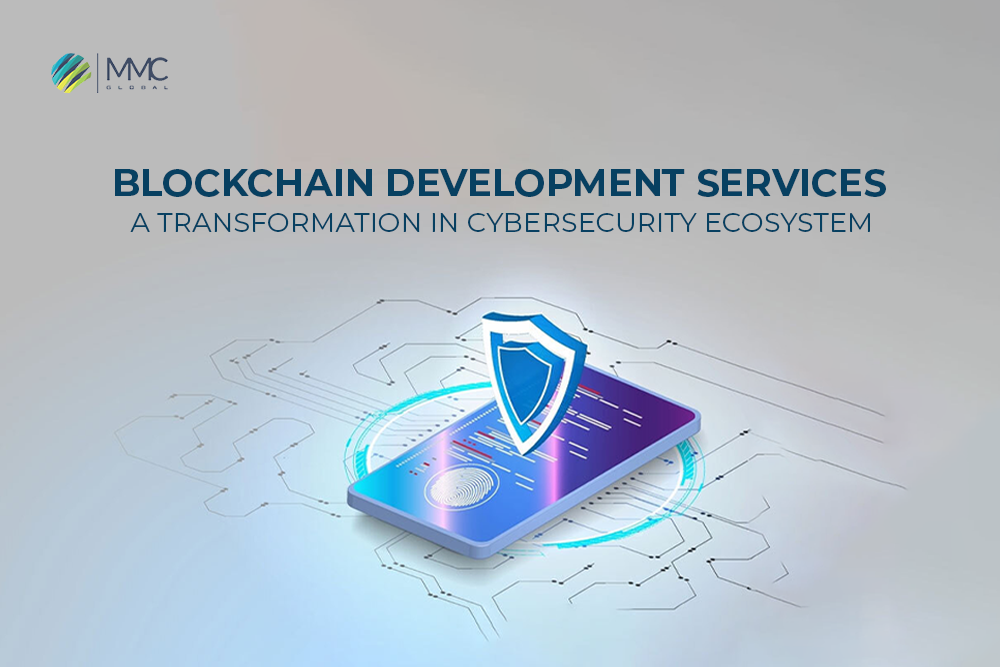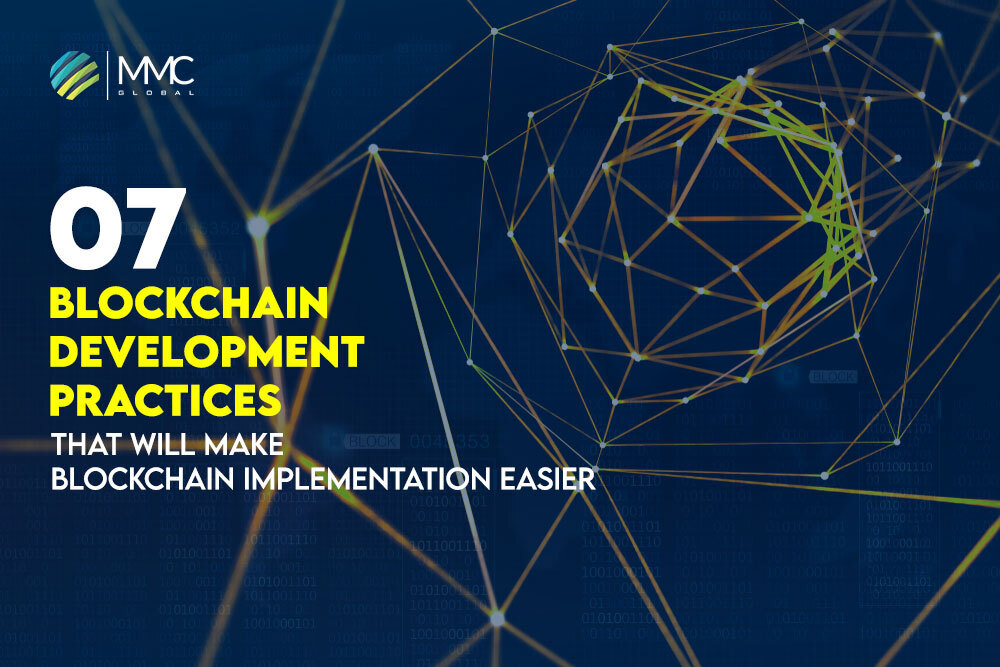Have you ever thought of this unforeseen emergence of Blockchain development? Ever wonder what it is? Well, if you do, you are at the right place! Blockchain – the name itself says a lot – is actually a chain of blocks in which blocks are digital data that is attached through cryptography.
Every single block contains a cryptographic hash function (mapping info of varying size to a fixed size, often referred to as hash value) connecting to the previous block. Also, every block contains a timestamp and digital data.
No wonder these blocks are organized in such a manner that it becomes very challenging to change the data. And they make sure transparency while also taking good care of security.
So, if you want to know more about Blockchain or are ever in need of blockchain development services, you can reach out to MMCGBL anytime. At our software development company with any type of technology, you can be sure of the quality of work you will be provided. Because we have been a company providing the service for years, several clients trust us from around the globe.
Let’s get to our topic and start where we left off, but before, we will learn about Blockchain.
What is Blockchain?
It is a blockchain that strengthens cryptocurrencies like Bitcoin, Dogecoin, and Ethereum. But the most prevailing one is Bitcoin which influences the market. Bitcoin as a digital currency has the advantage of low-cost transactions compared to government-issued currencies.
In a blockchain, a block is a source through which digital data is recorded. In contrast, cryptography (a channel that keeps information distinct and safe) is the means that connect the blocks. When these blocks pile together, they develop a chain similar to the public database.
The digital pieces of information contained in each block are comprised of three parts:
- Data, time, and money regarding the blockchain transaction are recorded.
- Details on the individual taking part in blockchain transactions are recorded in further detail. The purchase is being recorded without identifying information and anticipating a digital signature.
- The recent block can be distinguished from the previous one through Cryptographic Hash Function (CHF). It is a mathematical algorithm that converts data into a unique code made up of a hash that is distinct from the hashes of other blocks.
However, each block on a blockchain reserves roughly about 1MB of data in total. If we say it simply, a single block can hold the data about thousands of transactions being made.
There are a few things needed for a block to merge to the Blockchain, which first and foremost is a transaction that needs to occur. Now it will be checked via a multitude of computers shared through the internet.

We all know that transaction data is stored in a block with info, as mentioned above in the points. After that (as mentioned in a third point) hash is generated because every block must be different from the other.
The phrase distributed ledger refers to the fact that every participant in the blockchain development system possesses a version of the network. Blockchain systems also offer apps smart contract (chain node) solutions.
Though smart contracts are the ones that create blockchain transactions, to begin with: which are then allotted to peer nodes in the network while they are being recorded.
Best programming languages for blockchain development
C++
It is not an ordinary one and is included among the popular languages in the tech sphere, which is true even if we talk about blockchain development. But why is that? Because C++ has a multitude of capabilities like move semantic, advanced multi-threading, primitive control over memory, and many more object-oriented attributes.
Also, several object-oriented features in C++ enable developers to mould information and work in a single module. It is just like the blockchain shape blocks in cryptographic chains. While as a matter of fact, C++ is also popular with Bitcoin, a cryptocurrency, as the very first execution was originally written in C++.
Java
Java is considered a tough competition for C++ in the context of popularity and functionality. It applies to blockchain technology as well. Java contains a huge Application Programming Interface (API), including several Java classes, interfaces, and packages.
Moreover, it allows developers to create applications even if they don’t have the inside implementation. While there’s one property of Java that is specifically helpful in Blockchain is its flexibility. It also has the functionality “write once, run anywhere,” which makes it possible for Java to be moved to different platforms.
These programs have used the JVM (Java Virtual Machine), available on all platforms; therefore, they are not reliant on designs unique to any particular system. Together with Java’s other well-liked qualities, this flexibility makes it ideal for Blockchain development.
Python
The popularity of Python is well-known, and it is becoming the fastest and most popular in the whole world. If you are a newbie in the developing field, you should definitely opt for it as it could be the best blockchain language. There still is an issue with Python that it is a simple language that tends to create problems for complex cryptographic operations in Blockchain.
It manages several of its operating costs related to performance as Python is the object-oriented language. Another benefit of Python is that it allows developers to prototype their ideas without needing to code heavily. Also, it indeed has open-source support, and it is what makes it perfect for the Blockchain.
Additionally, you can find several libraries, plugins, and other resources online in Python for whatever problem you may encounter in blockchain development.
Read more about Python: Python Web App Development: Create Web Apps With Powerful Programming Language
Vyper
It is one of the new blockchain development languages from Python 3. Even though Vyper somehow doesn’t contain all of Python’s capabilities, the Vyper syntax is legitimate Python 3 syntax. Solidity’s alternative, Vyper, was developed. Alongside Solidity, it is typically utilized for the Ethereum Virtual Machine (EVM).
Yes! Vyper has different control structures compared to Solidity, and it also takes care of the security concerns differently. Vyper puts an end to several of the OOPS capabilities in Solidity as well as other features such as infinite loop, modifiers, recursive calling, and many more.
Because of this, Vyper can stay away from many security concerns that appear due to these features. Therefore, if you need a blockchain development language to write smart contracts, Vyper is the best choice!
Solidity
Creating smart contracts for the Ethereum Virtual Machine required the use of Solidity, one of the Blockchain’s quickly expanding programming languages (EVM). Ethereum – a blockchain-based allotted computing program and operating channel created in the first place.
As Solidity was created by keeping Blockchain in consideration, it can resolve so many issues developers are bombarded with. Solidity is equivalent to ECMAScript syntax yet contains features like variadic return types, static typing, etc. So, if you are willing to understand blockchain development profoundly, this is a suitable blockchain language.
C#
It has similarities with Java and C++ syntactically; you can say that it is the best blockchain development language. At its initial state, it was just created for Microsoft, but now it is considered the best blockchain language.
It will be easy for the developers who work on open source software to write codes with greater flexibility leveraging C#. Also, don’t worry; it will run on almost every device along with several operating systems like Windows, Linux, Mac, Android, etc.
As C# is an object-oriented programming language, maximum performance can be obtained while developing the next Blockchain.
Read more: C Sharp Programming Language for Web Development
Golang
Go is a fantastic programming language for constructing quick and effective Blockchain apps. It is the ideal language for building hyper ledger fabric, which serves as the basis for making Blockchain apps. Go is suitable for Blockchain coding because it is a developed programming language with unvarying data types.
Other features are included in it that boost performance, such as generic, classes, inheritance, constructors, annotations, exceptions, etc. It is not a difficult language and can be grasped pretty easily. The reality is that over 800,000 programmers on the Go language system are clear evidence of this.
JavaScript
NodeJS is a JavaScript default setting, which is one of the most widely used web languages and is also very liked by the developers. It implies that developers may utilize it to create innovative blockchain apps. Since every web system employs JavaScript in a certain way, this is a significant benefit over other programming languages.
The Lisk sidechain development kit (SDK) enables programmers to create, publish, and share their JavaScript-written Blockchain apps with minimal codebases. So, programmers do not have to stress about integration. Instead, they can concentrate on the blockchain app architecture.
Simplicity
One of the leading Blockchain programming languages, Simplicity, was developed by Russell O’Connor and released to the public in November 2017. The Simplicity programming language is built on Ivy and uses a syntax similar to Haskell, making development faster and more efficient.
In addition, it has a strong statistical component and renders the code line legible by humans. For this, it is often used to create blockchain technology and Smart Contracts that function in both the Bitcoin Virtual Machine and the Ethereum Virtual Machine (EVM).
Rholang
It is considered a great programming language for smart contract development. Unlike every other language having an object-oriented approach, Rholang has a functional approach. It enables developers to solve many problems regarding blockchain development.
Additionally, you can say it is the reason for its popularity. It differs significantly from languages like C++ or Python, which employ variables to store information and modify the state of the variables over time. So because of this, it is one of this group’s popular blockchain development languages.
Best programming languages for blockchain FAQs:
Question: Do employers want Blockchain developers?
Answer: Yes, there is a huge demand for blockchain developers. In fact, research has shown that there was a 517 percent increase in demand for Blockchain engineers in 2020 compared to what was observed in 2019. And in the upcoming years, this number is certain to rise. So, ultimately it implies how much blockchain development is in demand.
Question: How do you ensure product quality as a blockchain development company?
Answer: In MMCGBL, while collaborating with our clients, we implemented the Agile concept and made use of so-called Agile cycles (short iteration mode). In simple words, we evaluate our development work frequently and communicate the results to the client.
Following the client’s assessment of the findings, we include their suggestions as we carry on developing the final product. By doing this, we can deliver high-quality services on time.
Question: If someone wants to be involved in the development process, is it possible?
Answer: Sure! You can participate how much you wish. Each level of the development phase is susceptible to this. We encourage our clients to share their thoughts with us because we would gladly collaborate with them rather than just carrying out their requirements.
Bottom line
These are a few programming languages that you might want to take into account if you wish to pursue the blockchain industry and take full advantage of the growing possibility. Those languages, which have already been discussed in this post, have varying possibilities and can be utilized to create various Blockchain and cryptocurrency-based alternatives.
It indicates that you should be aware of the ideal languages for different types of Blockchain development and sharpen your proficiency in each. Yes! It is true that in order to create blockchain-based products, a variety of programming languages are available.
However, there isn’t a definite victor, and it might be challenging to determine which is ideal in each circumstance. Based on the task you’re engaged in, each has its perks. Therefore, you must choose a language based on the needs of your work, such as the resource, funding, time, functionality you would like to add, and many others.
Because there are numerous distinct blockchains to select from for multiple projects, it is usually more beneficial to speak with the top blockchain development company to get the best blockchain development services that could be the best before making a final decision.



